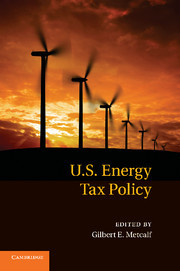Description
US Energy Tax Policy
Coordinator: Metcalf Gilbert E.
Brings together a collection of papers from academia, government, and policy think tanks on US energy tax policy.
Language: English
Subject for US Energy Tax Policy:
US Energy Tax Policy
Publication date: 08-2014
Support: Print on demand
Publication date: 08-2014
Support: Print on demand
U.S. Energy Tax Policy
Publication date: 12-2010
414 p. · 15.9x23.4 cm · Hardback
Publication date: 12-2010
414 p. · 15.9x23.4 cm · Hardback
Description
/li>Contents
/li>Biography
/li>
The United States face enormous challenges in the energy area. Climate change, biofuels policy, energy security and environmental degradation are all intimately bound up with energy production and consumption. Historically, the federal government has relied on tax subsidies to effect energy policy. With mounting federal deficits, policymakers and advocates are increasingly calling for a rethinking of our energy tax policy. How can the federal tax code strengthen environmental policy and reduce security concerns in the area of energy? The authors tackle such difficult problems as climate change, efficient taxation of oil and gas, and optimal oil tax policy in a world with OPEC oil producers dominating world oil supply. This volume presents a number of innovative policy suggestions backed by sophisticated and cutting-edge research carried out by leading scholars in the area of energy taxation.
1. Introduction Gilbert E. Metcalf; 2. Distributional impacts of carbon pricing policies in the electricity sector Dallas Burtraw, Margaret Walls and Joshua Blonz; Comments Don Fullerton, Comments Terry M. Dinan; 3. Distributional impacts of a US greenhouse gas policy: a general equilibrium analysis of carbon pricing Sebastian Rausch, Gilbert E. Metcalf, John M. Reilly and Sergey Paltsev; Comments Richard D. Morgenstern; 4. Instrument choice is instrument design David Weisbach; Comments Eric Toder; 5. Taxes, permits, and climate change Louis Kaplow; 6. Border adjustments for carbon taxes and the cost of emissions permits: economic, administrative, and legal issues Charles E. McLure; 7. Taxes and caps as climate policy instruments with domestic and imported fuels Jon Strand; 8. How much should highway fuels be taxed? Ian W. H. Parry; Comments Roberton C. Williams III; 9. State tax policy and oil production: the role of the severance tax and credits for drilling expenses Ujjayant Chakravorty, Shelby Gerking and Andrew Leach; 10. The social costs and benefits of US biofuel policies with pre-existing distortions Harry de Gorter and David R. Just; Comments Brent Yacobucci.
Gilbert E. Metcalf is Professor of Economics at Tufts University, Massachusetts, and a Research Associate at the National Bureau of Economic Research. He is also a Research Associate in the Joint Program on the Science and Policy of Global Change at MIT and currently a Visiting Professor in the Department of Economics at MIT where he teaches a class on the economics of energy markets. Professor Metcalf recently served as a member of the US National Academy of Sciences' Committee on Health, Environmental, and Other External Costs and Benefits of Energy Production and Consumption, and the peer-review team of the US Environmental Protection Agency's climate modeling efforts. He has also been a consultant on energy matters to the US Departments of the Treasury and Energy and Argonne National Laboratory. Professor Metcalf also serves on the Advisory Board for the SECURE (Security of Energy Considering Its Uncertainty, Risk, and Economic Implications) Project funded by the European Commission. An associate editor of the Journal of Economic Perspectives and a member of the editorial board of the Berkeley Electronic Journals in Economic Analysis and Policy, Professor Metcalf is the author of more than 70 papers in academic and professional journals, including the Journal of Political Economy, the Economic Journal, the Journal of Public Economics and the Review of Economics and Statistics. He coedited Behavioral and Distributional Effects of Environmental Policy (2001, with Carlo Carraro) and The Distribution of Tax Burdens (2003, with Don Fullerton). Professor Metcalf's primary research area is applied economics with particular interests in taxation, energy and environmental economics.
© 2024 LAVOISIER S.A.S.



